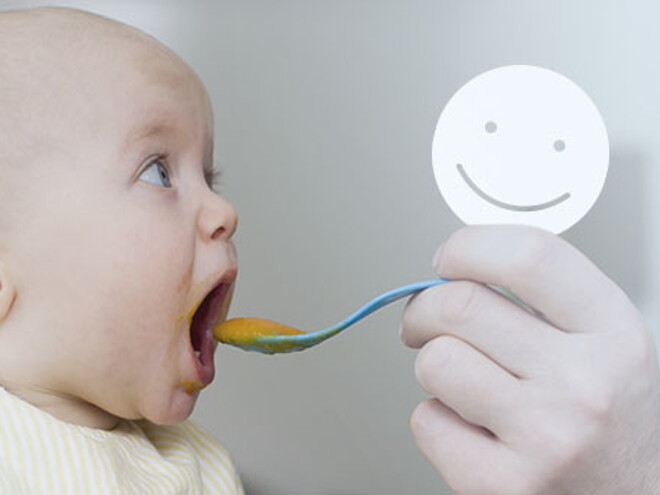
Your 6 to 7 month old’s hunger & fullness cues
Knowing when to feed
At this stage, your baby’s menu may have expanded to include more cereals and baby food varieties. His excitement over food can turn mealtime into a fun, playful experience for the both of you. Take advantage of it.
Hunger signs
- Still cries or fusses when hungry for milk or desires food.
- Reaches for spoonfuls of food.
- Opens mouth and leans in toward bowl or spoon.
- Stares at you while eating as if to say “I’m not done yet.”
Don’t force more food than your baby seems to want. Respect that he knows when he’s full.
Knowing when he’s full
Whether breast-, bottle- or spoon-feeding, your baby makes his wishes known when he’s full.
Fullness signs
- Turns his head from the nipple, if it’s breast or bottle.
- Leans away from the food and may push the spoon away.
- Clenches his mouth shut and doesn’t allow you to feed him.
- Spits out food that he likes.
- Pushes away the bowl or whatever food is there.
- Slows down the pace, gets distracted and looks elsewhere.
- Falls asleep while feeding.
Your 8 to 12 month old’s hunger & fullness cues
Knowing when to feed
It’s important to recognize hunger and fullness cues because a baby’s tummy is small. Although your baby’s portions may seem tiny, he eats less, but more frequently than you do. You are learning his cues for hunger and fullness, and he is learning how to respond to your behaviour.
Hunger signs
- Kicking his legs and banging on the high chair tray says “Hurry up with the food, Mum.”
- Putting fingers in his mouth and fussing, which lets you know he may be hungry.
- Carefully watches as you prepare his food, and is excited when you present it.
- Reaches for food when he sees it says “time to eat.”
- Eats with full attention on you and anticipates the next bite.
It is your job as a parent to provide healthy foods. It is your child’s job to decide what and how much to eat.
Knowing when he’s full
Your baby usually makes his wishes known when he’s full.
Fullness signs
- Turns his head or leans away from the spoon.
- Shuts his mouth tight and shakes his head “no” to say he’s had enough.
- Pushes away his bowl and tries to knock the spoon from your hand.
- No longer appears interested in eating and looks away from you.









